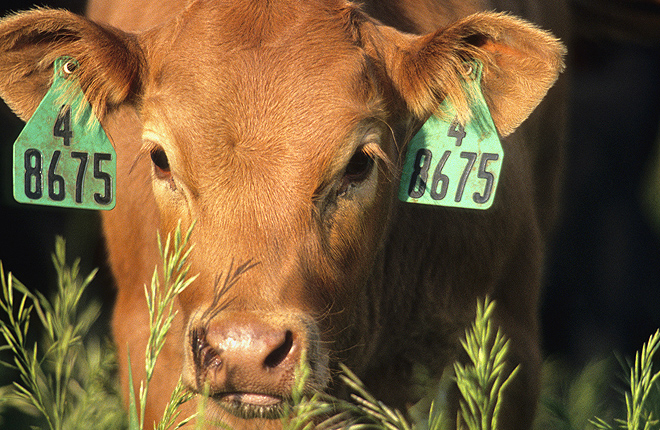The Genetics of Bovine Viral Diarrhea Infections
Bovine viral diarrhea virus (BVDV) infections cost cattle producers $50 to $100 per head of cattle. Most BVDV vaccines require multiple doses, and that increases production costs. Decades of vaccination and voluntary programs aimed at controlling the virus have reduced the disease's prevalence but have not eliminated it in the United States.
Animal scientist Eduardo Casas and his colleagues at the Agricultural Research Service's (ARS) National Animal Disease Center in Ames, Iowa, conducted a study to find genes associated with BVDV infections. "We want to identify these genes so that we may be able to avoid infection in the first place," says Casas. "We suspect BVDV is involved in suppressing the immune system by influencing the gene products, or proteins, so there may be an opportunity to counteract this effect."
BVDV disease is caused by a genetically variable group of viruses. BVDV infections can be transient or persistent. Compared to unaffected cattle, persistently infected cattle grow more slowly and have difficulty reaching commercial weights. Worse, they are sources of BVDV infections for their herd mates, causing major losses for producers.
"Persistent infection begins when a fetus is infected during the early stages of development, resulting in a calf that is immune tolerant and sheds a significant amount of virus," says Casas. BVDV infection in later stages of pregnancy can result in abortions and stillbirths. BVDV can also suppress the immune system of calves and adults, resulting in infections with other viruses or bacteria.
The objective of Casas' study was to identify genes important in the animal's immunological defense. The research team compared the genomes of persistently infected cattle with those of unaffected cattle and found 16 regions of the genome that had differences. Of the 16 regions, 7 showed significant BVDV association.
Immunity genes in these regions allow the animal to defend itself and function normally. Identifying the regions and the genes in them can lay the groundwork for future studies to understand how the virus suppresses host immune functions and causes infection and disease. By understanding which genes in the host are influenced by the virus, it may be possible to counteract the effect of the virus and reduce or eliminate the impact of BVDV in U.S. cattle. — By Sharon Durham, ARS Office of Communications.
"The Genetics of Bovine Viral Diarrhea Infections" was published in the July 2016 issue of AgResearch Magazine.
Key Facts
- BVDV (bovine viral diarrhea virus) is a disease of cattle.
- Infections cost producers $50 to $100 per cow.
- ARS scientists found genes linked to BVDV infection.
Full Story







